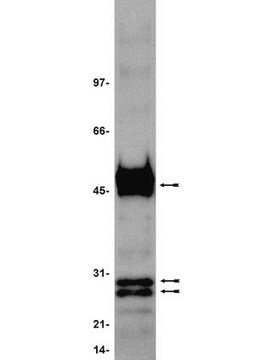50869-U
Ascentis® Express 90 Å F5 (2 μm) HPLC Columns
L × I.D. 3 cm × 3 mm UHPLC Column
About This Item
Recommended Products
Product Name
Ascentis® Express F5, 2 μm UHPLC Column, 2 μm particle size, L × I.D. 3 cm × 3 mm
material
stainless steel column
Quality Level
agency
suitable for USP L43
product line
Ascentis®
feature
endcapped
manufacturer/tradename
Ascentis®
packaging
1 ea of
parameter
1000 bar max. pressure (14500 psi)
60 °C temp. range
technique(s)
LC/MS: suitable
UHPLC-MS: suitable
UHPLC: suitable
L × I.D.
3 cm × 3 mm
surface area
120 m2/g
impurities
<5 ppm metals
matrix
Fused-Core particle platform
superficially porous particle
matrix active group
PFP (pentafluorophenyl) phase
particle size
2 μm
pore size
90 Å pore size
operating pH
2-8
application(s)
food and beverages
separation technique
reversed phase
Looking for similar products? Visit Product Comparison Guide
General description
Legal Information
Not finding the right product?
Try our Product Selector Tool.
Choose from one of the most recent versions:
Certificates of Analysis (COA)
Don't see the Right Version?
If you require a particular version, you can look up a specific certificate by the Lot or Batch number.
Already Own This Product?
Find documentation for the products that you have recently purchased in the Document Library.
Our team of scientists has experience in all areas of research including Life Science, Material Science, Chemical Synthesis, Chromatography, Analytical and many others.
Contact Technical Service






